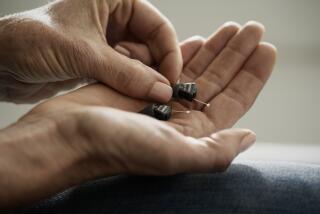Hearing Aid Firms Warned on Ad Claims : Health: FDA says six manufacturers are misleading the public and are creating ‘unrealistic expectations’ about their products.
- Share via
WASHINGTON — The Food and Drug Administration said Monday that it has warned the nation’s six largest manufacturers of hearing aids to stop “misleading the public” about the effectiveness of their products or face regulatory action.
In letters sent April 16, the agency told the companies that their advertising, promotion and labeling create “unrealistic expectations” about the performance of the devices.
About 5.8 million Americans wear hearing aids and an estimated 10 million people older than 65 suffer from some form of hearing loss, the agency said.
According to the American Assn. of Retired Persons, estimates of individuals with hearing loss range as high as 24 million, with about 60% of them older than 65. The elderly purchase 65% of all hearing aids, the AARP said.
Lee Norrgard, senior investigative analyst with the AARP’s office of consumer affairs, said hearing devices are second only to canes as the most widely used health aids, “so clearly this is an issue of major importance to the elderly population.”
The FDA said the six firms under scrutiny represent the bulk of the hearing aid market.
The agency took issue with claims made by the firms that their hearing aids significantly improve a user’s ability to hear and comprehend the spoken word in such noisy environments as restaurants, baseball games, crowded rooms, theaters and churches.
The claims imply that those who use the devices would be able to distinguish speech from extraneous sounds and that the hearing aids would not amplify background noises, the FDA said.
Such claims are not supported by clinical data, the FDA said.
“People who have hearing deficits should seek help and nothing we’re saying should deter people from seeking help. Advertising is fine if it gets people to seek help,” said FDA Commissioner David A. Kessler. “But we just want the advertising to tell the whole story.”
Karen Turner, a spokeswoman for Dahlberg Inc., of Golden Valley, Minn., which makes the Miracle Ear Clarifier and Micro Elite, declined comment on the substance of the agency’s complaints. But she said: “Miracle Ear is fully committed to continuing to provide safe and effective products that are in full compliance with all regulatory agencies.”
William Austin, president of Starkey Laboratories Inc., of Eden Prairie, Minn., which manufactures Secret Ear, said he was surprised that his company was among those cited because “we built our business on extending our responsibility to the consumer.”
He said, for example, that the company established a 90-day trial policy on all of its hearing aids more than 20 years ago and gives away thousands of hearing aids in the United States and abroad to those who cannot afford them.
“People thought we’d go out of business with such a policy but we thought it was the right thing to do,” he said.
“We think we’re pretty good citizens, so to be accused of misleading people--we don’t think we merit this attack.”
The other companies include Electone Inc., of Longwood, Fla., which manufactures the Gold Series, Faro I and II, Neptune and M30; Siemens Hearing Instruments, of Piscataway, N.J., which makes the LifeSound models; Omni Hearing Systems, a subsidiary of Starkey in Carrollton, Tex., which makes the Enviro 2000; and Baltone Electronics Corp., of Chicago, the manufacturer of ClearVoice, Prima LFE and Opera.
The FDA told the companies to remove all misleading promotional literature and advertising immediately and threatened that failure to comply could lead to seizure of their products, injunctions and civil penalties.
The FDA said many of the ads “overstate the quality and value” of the devices, claiming, for example, to be able to overcome deafness caused by nerve damage.
Kessler said nerve-related deafness occurs naturally with aging and is not reversible.
“None of these devices is going to restore hearing to what it was,” he said.
Furthermore, he said: “There is no hearing-aid technology on the market that allows you to amplify just speech and not background noise.”
More to Read
Inside the business of entertainment
The Wide Shot brings you news, analysis and insights on everything from streaming wars to production — and what it all means for the future.
You may occasionally receive promotional content from the Los Angeles Times.










